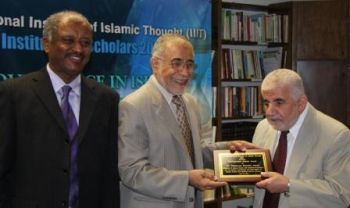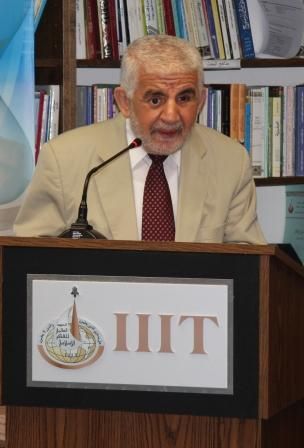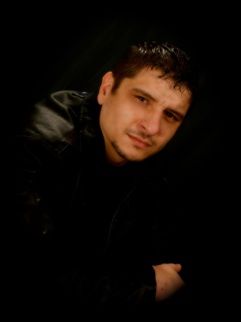
Publisher:
Bonnie King
CONTACT:
Newsroom@Salem-news.com
Advertising:
Adsales@Salem-news.com

~Truth~
~Justice~
~Peace~
TJP
Oct-13-2012 13:39

 TweetFollow @OregonNews
TweetFollow @OregonNews
Professor Mahmoud Ayoub Receives 2012 Distinguished Scholar Award from the International Institute of Islamic Thought
Submitted by Agron Belica Salem-News.comA noted scholar in the history of religion, the beloved Professor has been an extremely valuable resource in my research.
 Left to right, Abubaker al-Shingieti, Executive Director of the International Institute of Islamic Thought and Board member, Hartford Seminary; Jamal Barzinji, Vice President of IIIT; and Professor Mahmoud Ayoub |
(BOSTON / HARTFORD) - Professor Mahmoud Ayoub is a rare and valuable man. His worldly insight results from a lifetime of dedicated, enthusiastic learning and teaching and I am so pleased to bring our readers this news about his receiving the 2012 Distinguished Scholar Award from the International Institute of Islamic Thought (IIIT).
Dr. Ayoub is Faculty Associate in Islam and Christian-Muslim Relations at Hartford Seminary, the award is a result of his leadership in the Institute's Summer Institute for Scholars.
A noted scholar in the history of religion, the beloved Professor has been an extremely valuable resource in my research. He was there for me time and time again when I was faced with truly puzzling questions while writing my book, and always helpful to no end.
A native of Lebanon, Dr. Ayoub has authored a number of books in both English and Arabic in the area of Islam and Inter-religious dialogue. The most notable are Redemptive Suffering in Islam and The Qur’an and Its Interpreters (2 volumes to date). He has published over fifty scholarly articles both as chapters in edited works as well as in well-known academic refereed journals. Two of his recent works are Crisis of Muslim History: Religion and Politics in Early Islam, 2003, and (forthcoming, 2004) Islam in Faith and History (both published by Oneworld Publications). Currently he is working on the third volume of The Qur’an and Its Interpreters.
He received the award at a ceremony on Wednesday, July 18, said that he is honored by the recognition. He also praised the Institute for its commitment to "Islamic studies and Muslim Unity." He complimented Jamal al-Barzinji, vice president of IIIT, and Abubaker Al Shingieti, executive director, for their creative leadership, Hartford Seminary noted in their article about the event.
 |
The Summer Institute for Scholars 2012 started at IIIT headquarters in Herndon, VA, on July 9 with an opening lecture on “Ethics and Government: IbnTaymiyya Against Extremism” by Yahya Michot, Professor of Islamic Studies and Christian-Muslim Relations at Hartford Seminary. The theme of the gathering this year is “Good Governance in Islam: Classical and Contemporary Approaches."
The program included lectures, paper presentations and panel discussions by more than 15 scholars from different academic backgrounds. Also participating were the students enrolled in the IIIT Summer students program for the current year.
Dr. Ayoub received his education at the
From 1988 to 2008, he was a Professor and Director of Islamic Studies in the Department of Religion, Temple University, Philadelphia, an Adjunct Professor at the Duncan Black Macdonald Center, Hartford Seminary, Connecticut, a Research Fellow at the Middle East Center, University of Pennsylvania and the Tolson visiting professor at the Pacific School of Religion, Berkeley California. In 1998, Dr. Ayoub helped devise and launch a graduate M.A. level program in Muslim-Christian relations and comparative religion for the Centre for Christian-Muslim Studies, University of Balamand, Lebanon, and since the Spring of 1999, has been its visiting professor. Dr. Ayoub also previously taught at San Diego State University, the University of Toronto, and McGill University.
Throughout his academic career, Mahmoud Ayoub has received distinguished awards and
Mahmoud Ayoub’s authority in both
Source: Mahmoud Ayoub Receives Distinguished Scholar Award
Agron Belica, Salem-News.com Boston Bureau Chief
 |
Of Albanian descent, first-generation American Agron Belica is largely self-educated. He accepted the responsibilities of life after his undisciplined teen years, spent mostly on the street with reckless gangbangers and brushes with the law. He is now married and the couple now have three children, all boys. His about-face was total and he began to study inspirational works and comparative religion.
He attended classes on Islam in New Jersey focusing on religious tenets, doctrinal differences, and the claims and beliefs of various Muslim sects. He also studied the proper recitation of the Quran and attained such proficiency in it that he was selected to perform the call to prayer, a great honor in a mosque, second only to leading the formal prayers.
Belica had a special interest in the history of the Prophet Yahya—John the Baptist. In 2008, this interest resulted in the issuance of his first essay on the neglected prophet: The Revival of the Prophet Yahya, a small article presenting an unorthodox view of Yahya/John. His revolutionary ideas attracted critics, vilifiers, and supporters. Among the latter, was the enterprising reporter, and award winning journalist, Tim King of Salem-News.com, who interviewed Belica. With the publication of that interview, Belica’s ideas went global.
The following year, he released a more thorough exposition of various aspects of the Yahya question: The Crucifixion: Mistaken Identity? (harvardbookstore.com). This time, the historical circumstances of the career of John the Baptist, extra-Biblical sources were carefully studied and cited and Belica’s contention that John was not beheaded was reinforced by the inclusion of Dr. Jay R. Crook’s essay. Rethinking John the Baptist, that strongly contests the validity of the Biblical version of John’s death on chronological grounds. Dr. Crook has also included that essay as an appendix in the revised edition of the volume on Jesus in his The Bible: An Islamic Perspective.
 |
 |
 |
Articles for October 12, 2012 | Articles for October 13, 2012 | Articles for October 14, 2012

Quick Links
DINING
Willamette UniversityGoudy Commons Cafe
Dine on the Queen
Willamette Queen Sternwheeler
MUST SEE SALEM
Oregon Capitol ToursCapitol History Gateway
Willamette River Ride
Willamette Queen Sternwheeler
Historic Home Tours:
Deepwood Museum
The Bush House
Gaiety Hollow Garden
AUCTIONS - APPRAISALS
Auction Masters & AppraisalsCONSTRUCTION SERVICES
Roofing and ContractingSheridan, Ore.
ONLINE SHOPPING
Special Occasion DressesAdvertise with Salem-News
Contact:AdSales@Salem-News.com


Salem-News.com:

Terms of Service | Privacy Policy
All comments and messages are approved by people and self promotional links or unacceptable comments are denied.
[Return to Top]
©2025 Salem-News.com. All opinions expressed in this article are those of the author and do not necessarily reflect those of Salem-News.com.